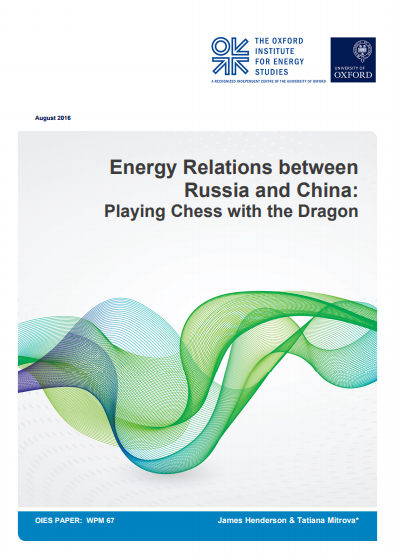Energy Relations between Russia and China: Playing Chess with the Dragon

Post-sanctions Russia-China energy relations: what expectations?
Russia's relationship with China has a long and complex history, catalysed by the lengthy border between the two countries, the complementarity of their economies and the ambitions of both to be seen as key global geo-political actors. Following periods of tension and friendship in the Soviet era, when the two communist states often struggled to find a mutual understanding, the post-Soviet era has seen a more complicated relationship develop based as much on economic reality as political ideology.
Russia's economy has suffered collapse and recovery, often driven by oil price volatility, and has yet to achieve much-craved stability and consistent growth. China, meanwhile, has genuinely become an economic superpower, having enjoyed growth rates in the 7-15% per annum range since the mid-1990s and has now become the second largest economy in the world in terms of nominal GDP.
China's rapid economic growth, which has largely been based on industrial expansion, has also seen it become, since 2009, the world's largest energy consumer, with total primary energy demand in 2015 of just over 3 billion tonnes of oil equivalent. The geographical accident that China is also located next to the world's largest owner of fossil fuel reserves means that a commercial relationship based on energy was bound to emerge, and the development of ties between the two countries based on oil, gas and coal trade has generated significant interest and discussion. In particular over the past decade, as Chinese energy imports have increased rapidly while Russia has sought new markets for its key commodities, the issues of inter-dependency, reliance and security have been at the forefront of the debate.
This paper aims to contribute to the literature on the Russia-China energy relationship by providing detailed evidence of activity in the post-sanctions period, a comprehensive review of recent negotiations and transactions, and an assessment of the current state of the balance of bargaining power and cooperation between the two countries.
This content is available at the Oxford Institute for Energy Studies' website: Energy Relations between Russia and China - Playing Chess with the Dragon

Available in:
Regions and themes
Share
Related centers and programs
Discover our other research centers and programsFind out more
Discover all our analysesThe Caspian Sea as an Emerging Energy Hub : Potentials and Limitations
This report analyzes the prospects of the Caspian Sea region — and its key actors except for Russia and Iran — becoming an important energy hub serving the needs of the European Union (EU).
The European Union's Strategic Test in Georgia
The political crisis brewing in Georgia is of an existential nature for the country. What is at stake is Georgia's future as a democratic and sovereign European nation (EU).
Commanders of Putin's Long War: Purged, Reshuffled and Disgruntled
The trend of reshuffling the Russian top military command in the course of a fast-evolving and far from successful war has progressed unevenly both across the Armed Forces’ structures and in time. The rationale for and timing of the abrupt cadre decisions made by Commander-in-Chief Putin often defy logical explanation, and the rare official clarifications are no more informative than the usual information blackout.
Russian Military Manpower After Two and a Half Years of War in Ukraine
In addition to a military victory in Ukraine, the Russian leadership is planning to build up sizable troop formations for a possible conflict with NATO in the Baltic region and the Kola Peninsula. In particular, current plans aim for the military manpower to grow by about 350,000, reaching a total of 1.5 million soldiers and commanders. In the context of the current conflict in Ukraine, this cannot be accomplished without a new wave of mass mobilization.








